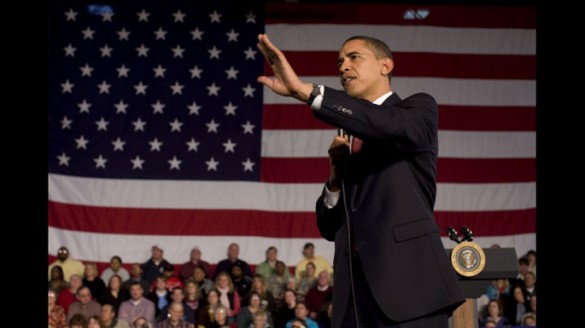
One factor will go a long way toward determining whether President Obama – or any incumbent president – is re-elected, claims a Vanderbilt University political scientist.
Here it is: if the real disposable incomes of voters are growing – even modestly -in the six months before Election Day, Obama is likely to win. If they aren’t, he is likely to lose. So says Larry Bartels, the May Werthan Shayne Professor of Public Policy and Social Science and professor of political science at Vanderbilt.
Of the many economic indicators featured in the news, this one (which includes income from wages, investments, tax cuts, and government benefits) is the most reliable predictor of an incumbent’s fortunes. More familiar indicators like unemployment and GDP growth seem to matter much less, probably because they are less closely tied to the average voter’s sense of economic well-being.

According to Bartels, who has researched voter trends for more than three decades, election-year income growth is more important than campaign-specific factors like who the opposition party nominates. It is also more important than economic performance over the incumbent’s entire term. Thus, even though the economy has been faltering for much of Obama’s presidency, he could be propelled to victory by an upturn in real incomes in the months leading up to the election.
“Voters tend to have very short memories,” Bartels said. “So if next year things are looking better, that’s going to be a huge plus for Obama in spite of the fact that people have felt a lot of pain up until this point.”
The phenomenon may go back centuries. Although there’s no hard research on political attitudes in ancient Egypt, the fortunes of the pharaoh were sometimes said to depend on whether the Nile River flooded. If the annual floods came as expected, farmland remained fertile and Egyptians prospered.
“[rquote]The pharaoh’s advisers would wish him a good flood,” Bartels said, “because his authority as a ruler was tied to the prosperity of his people[/rquote].”
Bartels has done extensive research on the impact of economic conditions on voting behavior, and his work is frequently cited in the national press. His 2008 book Unequal Democracy: The Political Economy of the New Gilded Age was cited by Obama during his first presidential campaign and was named in The New York Times as one of the “economics books of the year.”
Just as Egyptians might blame their ruler for lack of flooding, modern voters often do a poor job of perceiving why economic conditions improve or deteriorate, Bartels said. He and other political scientists have shown that incumbent politicians’ reelection prospects are affected by such idiosyncratic factors as floods, shark attacks, and the success or failure of hometown football teams.
“Developments in Europe are likely to have a huge impact on the U.S. economy,” he said. “But voters aren’t going to be able to parcel out what’s due to the president’s policies and what’s due to other factors.”
Should this information be the impetus for a voter education movement? Bartels is doubtful that would be successful.
“In the current polarized partisan climate, it’s hard to imagine what kind of educational effort would work, because there’s always a strong political interest on both sides to frame the issue of the economy to their own advantage,” he said.
“When the economy is bad under a Republican president, Republicans have an interest in thinking that it has nothing to do with the president’s policies, and Democrats are big on the voters holding the president accountable. And when the situation is reversed, the partisan interests are reversed.”
Both political parties are aware of the dynamic Bartels describes, he said. Obama will try to stimulate the economy to give himself an economic boost at the proper time to help him get re-elected. Republicans will try to thwart any such effort.
“I think that does cause problems in governing,” Bartels says, “but I wouldn’t say in a general sense that it means democracy doesn’t work. Because if you say that, you have to ask—in comparison to what?”
Full reports on studies by Larry Bartels mentioned in this release can be accessed at:
Musical Chairs: Pocketbook Voting and the Limits of Democratic Accountability
Blind Retrospection: Electoral Responses to Drought, Flu, and Shark Attacks
Partisan Hearts and Gall Bladders: Retrospection and Realignment in the Wake of the Great Depression
Ideology and Retrospection in Electoral Responses to the Great Recession